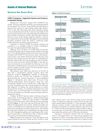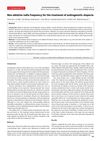 September 2021 in “Physiology News”
September 2021 in “Physiology News” Increasing research diversity is key for better understanding and treating Parkinson's Disease.
 41 citations,
February 2021 in “Cureus”
41 citations,
February 2021 in “Cureus” Proxalutamide helps COVID-19 patients get rid of the virus faster and recover quicker.
 8 citations,
December 2022 in “Nature Reviews Endocrinology”
8 citations,
December 2022 in “Nature Reviews Endocrinology” Sex hormones' effects on COVID-19 are unclear and more research is needed to understand their potential as treatment.
[object Object]  1 citations,
February 2023 in “JMIR. Journal of medical internet research/Journal of medical internet research”
1 citations,
February 2023 in “JMIR. Journal of medical internet research/Journal of medical internet research” Social media data can help track COVID-19 symptoms and predict the pandemic's status.
1 citations,
January 2023 in “OALib” Fatigue, loss of taste and smell, and cough are common long-term symptoms after COVID-19.
 June 2024 in “JURNAL PENDIDIKAN DAN KELUARGA”
June 2024 in “JURNAL PENDIDIKAN DAN KELUARGA” Celery extract can be used as a natural hair tonic for treating hair loss.

Scalp tonics are popular for stress-related hair loss, but minoxidil is used less due to side effects and inconvenience.
 213 citations,
December 2020 in “Annals of internal medicine”
213 citations,
December 2020 in “Annals of internal medicine” Many COVID-19 patients still have symptoms like fatigue and loss of taste or smell a month after diagnosis.
 August 2016 in “Journal of Investigative Dermatology”
August 2016 in “Journal of Investigative Dermatology” Human hair follicles have a scent receptor that can influence hair growth.
 October 2020 in “Journal of Ayurvedic and herbal medicine”
October 2020 in “Journal of Ayurvedic and herbal medicine” Dheedhi Herbal Shampoo is effective and safe for treating hair loss and dandruff.
 82 citations,
September 2018 in “Nature Communications”
82 citations,
September 2018 in “Nature Communications” A certain smell receptor in hair follicles can affect hair growth when activated by a synthetic sandalwood scent.
 1 citations,
August 2016 in “Journal of Investigative Dermatology”
1 citations,
August 2016 in “Journal of Investigative Dermatology” Activating STAT5 in the skin's dermal papilla is key for starting hair growth, regenerating hair follicles, and healing wounds.
 January 2019 in “Acta dermatovenerologica Alpina, Pannonica et Adriatica (Tiskana izd.)”
January 2019 in “Acta dermatovenerologica Alpina, Pannonica et Adriatica (Tiskana izd.)” Non-ablative radio frequency can potentially increase hair count in men with androgenetic alopecia, but some may be bothered by the smell during treatment.
 3 citations,
April 2023 in “Clinical and Experimental Medicine”
3 citations,
April 2023 in “Clinical and Experimental Medicine” The study identified five types of long COVID symptoms and suggests tailored management strategies for each.
May 2022 in “Endocrine practice” High-dose biotin can cause false thyroid test results; stop taking biotin two days before testing to avoid errors.
 5 citations,
November 2020 in “medRxiv (Cold Spring Harbor Laboratory)”
5 citations,
November 2020 in “medRxiv (Cold Spring Harbor Laboratory)” 5-Alpha-Reductase inhibitors shorten COVID-19 recovery time in men.
 1 citations,
January 2018 in “Journal of cosmetology & trichology”
1 citations,
January 2018 in “Journal of cosmetology & trichology” Hair loss lotion with specific ingredients effectively improves hair growth and thickness safely.
 February 2021 in “Austin journal of nutrition & metabolism”
February 2021 in “Austin journal of nutrition & metabolism” Appropriate zinc levels may help prevent hair loss in university students.
 79 citations,
January 2017 in “Dermatology practical & conceptual”
79 citations,
January 2017 in “Dermatology practical & conceptual” Correcting nutrient deficiencies may help with hair loss, but the benefits of supplements without a deficiency are uncertain and could be harmful.
 24 citations,
July 1987 in “Dermatologic Clinics”
24 citations,
July 1987 in “Dermatologic Clinics” Systemic diseases can cause hair loss, which is often reversible with treatment.
 8 citations,
March 2020 in “Dermatologic Therapy”
8 citations,
March 2020 in “Dermatologic Therapy” The new hair loss treatment kit was safe and improved hair growth without any adverse effects.
[object Object]  3 citations,
October 2018 in “Skin appendage disorders”
3 citations,
October 2018 in “Skin appendage disorders” New treatment reduces hair shedding and increases hair density in women with early hair loss.
 3 citations,
January 2018
3 citations,
January 2018 Amla oil may help treat hair loss.
 December 2023 in “Advances in economics, management and political sciences”
December 2023 in “Advances in economics, management and political sciences” Consumers prefer general hair care products over those specifically for hair loss.
 January 2015 in “Springer eBooks”
January 2015 in “Springer eBooks” Some alternative treatments may help with hair loss, but more evidence is needed to confirm their effectiveness.
 21 citations,
January 2012 in “Annals of Dermatology”
21 citations,
January 2012 in “Annals of Dermatology” 17α-Estradiol solution safely improves hair density and thickness in female pattern hair loss.
 1 citations,
May 2017 in “InTech eBooks”
1 citations,
May 2017 in “InTech eBooks” Some natural remedies may help with hair regrowth, but more research is needed to confirm their effectiveness and safety.
 43 citations,
January 2007 in “American Journal of Clinical Dermatology”
43 citations,
January 2007 in “American Journal of Clinical Dermatology” Combined minoxidil and tretinoin solution works as well as regular minoxidil for male hair loss.
 9 citations,
February 1996 in “Lancet”
9 citations,
February 1996 in “Lancet” Some tuberculosis drugs may cause hair loss, but hair might regrow after treatment or changing the drugs.
 July 2024 in “Revista Científica de Estética e Cosmetologia”
July 2024 in “Revista Científica de Estética e Cosmetologia” The babassu fiber exfoliating product for hair loss should be stored in a cool place to stay effective.




























